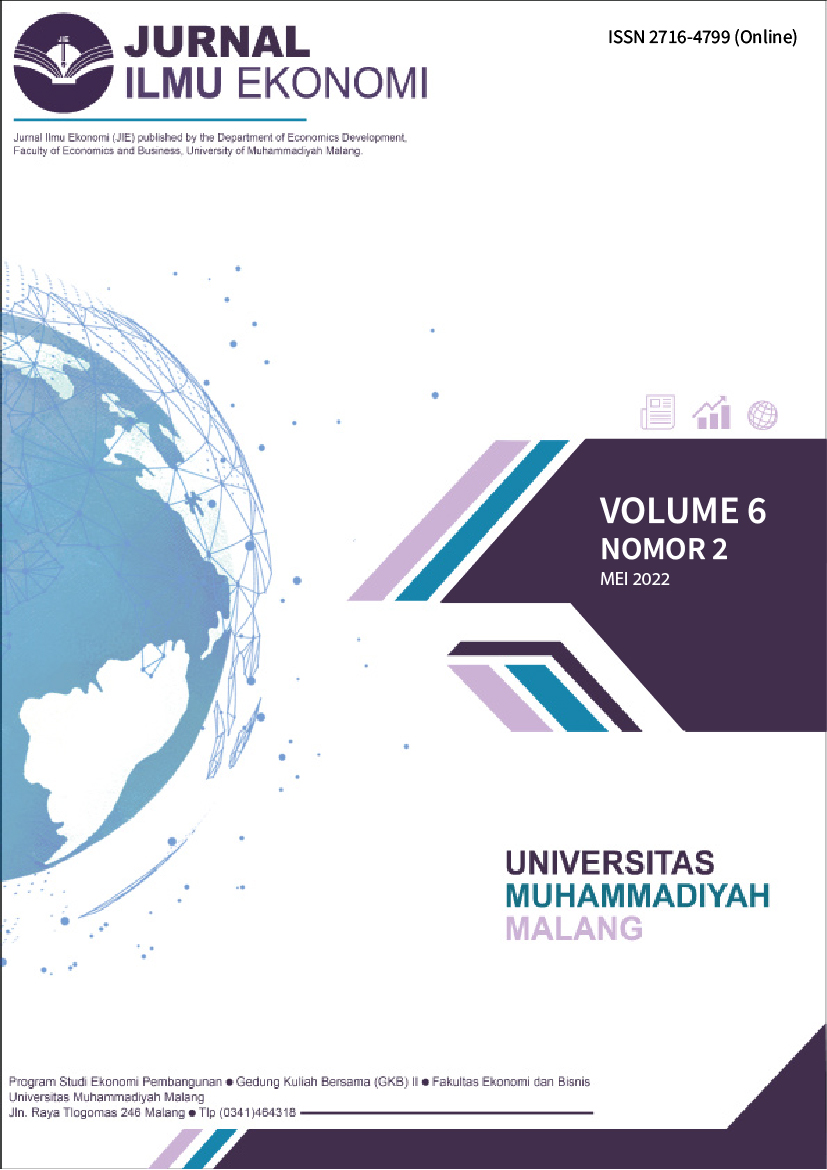Analisis Determinan Penduduk Miskin di Provinsi Jawa Tengah Tahun 2015-2020
DOI:
https://doi.org/10.22219/jie.v6i2.20516Keywords:
penduduk miskin, indeks pembangunan manusia, laju pertumbuhan ekonomi , tingkat pengangguran terbukaAbstract
This study aims to analyze the rate of economic growth, the human development index, the level of concern for the poor in Central Java Province in 2015 – 2020. The type of data used in this study is panel data. The tool used to perform the test is eviews9. The tests used in this study were FE, CE, RE, Chou, Hausman, LM, multiple linear regression and normality tests. The results show that the economic growth rate has a significant negative effect where the coefficient value is -0.043 with a probability value of 0.0475, the human development index has a significant negative effect where the coefficient value is -1.104 with a probability value of 0.0000, and the level of open partition has an insignificant effect with a coefficient 0.071 with a probability value of 0.2727.
Downloads
References
Andhykha, R., Handayani, H. R., & Woyanti, N. (2018). Analisis Pengaruh PDRB, Tingkat Pengangguran, dan IPM Terhadap Tingkat Kemiskinan di Provinsi Jawa Tengah. Media Ekonomi Dan Manajemen, 33(2), 113–123. https://doi.org/10.24856/mem.v33i2.671
BPS-Statistics Indonesia. (2019). Penghitungan dan Analisis Kemiskinan Makro Indonesia Tahun 2019. Penghitungan Dan Analisis Kemiskinan Makro Indonesia Tahun 2019, 300. https://www.bps.go.id/publication/2019/12/20/60138aa2d7b9b78802991240/penghitungan-dan-analisis-kemiskinan-makro-di-indonesia-tahun-2019.html
Jekulo, Annur, R. A. (2013). Faktor-Faktor yang Mempengaruhi Kemiskinan di Kecamatan Jekulo dan Mejobo Kabupaten Kudus Tahun 2013. Economics Development Analysis Journal, 2(4), 409–426. https://doi.org/10.15294/edaj.v2i4.3209
Kumalasari, E. (2019). Pengaruh Indeks Pembangunan Manusia, Produk Domestik Regional Bruto dan Tingkat Pengangguran Terbuka Terhadap Tingkat Kemiskinan Kabupaten/Kota di Kawasan Pulau Madura (Issue April). Muhammadiyah Malang.
Okta Ryan Pranata Yudha Pembangunan, J. E., Ekonomi, F., & Semarang, U. N. (2013). Pengaruh Pertumbuhan Ekonomi, Upah Minimum, Tingkat Pengangguran Terbuka, dan Inflasi Terhadap Kemiskinan di Indonesia Tahun 2009-2011. In Pengaruh Pertumbuhan Ekonomi, Upah Minimum, Tingkat Pengangguran Terbuka dan Inflasi Terhadap Kemiskinan Di Indonesia Tahun 2009-2011. Negeri Semanrang.
Saputra, W. A. (2011). Tingkat Kemiskinan [Diponegoro]. In Ekonomi dan Bisnis. http://eprints.undip.ac.id/28982/1/Skripsi018.pdf
Sukmaraga, P. (2011). Analisis Pengaruh Indeks Pembangunan Manusia, PDRB, Per Kapita, dan Jumlah Pengangguran Terhadap Jumlah Penduduk Miskin di Provinsi Jawa Tengah. In Harvard Business Review (Vol. 85, Issue 3). Diponegoro.
Wibisono, R. Y. (2015). Analisis Pengaruh PDRB, Pengangguran dan Pendidikan Terhadap Kemiskinan di Jawa Tengah 2008-2013. (Vol. 1, Issue 1). Diponegoro.
Zurisdah, Z. (2016). Pengaruh Tingkat Pengangguran Terbuka Terhadap Tingkat Kemiskinan di Provinsi Banten. Institut Agama Islam Negeri (IAIN) Sultan Maulana Hasanuddin Banten.
Downloads
Published
How to Cite
Issue
Section
License
Copyright (c) 2022 Aditya Eka Mahardika M.S

This work is licensed under a Creative Commons Attribution-ShareAlike 4.0 International License.
Authors who publish with this journal agree to the following terms:
- For all articles published in the JIE (Jurnal Ilmu Ekonomi), copyright is retained by the authors. Authors give permission to the publisher to announce the work with conditions. When the manuscript is accepted for publication, the authors agree to the automatic transfer of non-exclusive publishing rights to the publisher.
- Authors retain copyright and grant the journal right of first publication with the work simultaneously licensed under a Creative Commons Attribution-NonCommercial-ShareAlike 4.0 International License that allows others to share the work with an acknowledgement of the work's authorship and initial publication in this journal.
- Authors are able to enter into separate, additional contractual arrangements for the non-exclusive distribution of the journal's published version of the work (e.g., post it to an institutional repository or publish it in a book), with an acknowledgement of its initial publication in this journal.
- Authors are permitted and encouraged to post their work online (e.g., in institutional repositories or on their website) prior to and during the submission process, as it can lead to productive exchanges, as well as earlier and greater citation of published work (See The Effect of Open Access).
This is an open access article and licensed under a Creative Commons Attribution-NonCommercial-ShareAlike 4.0 International License








